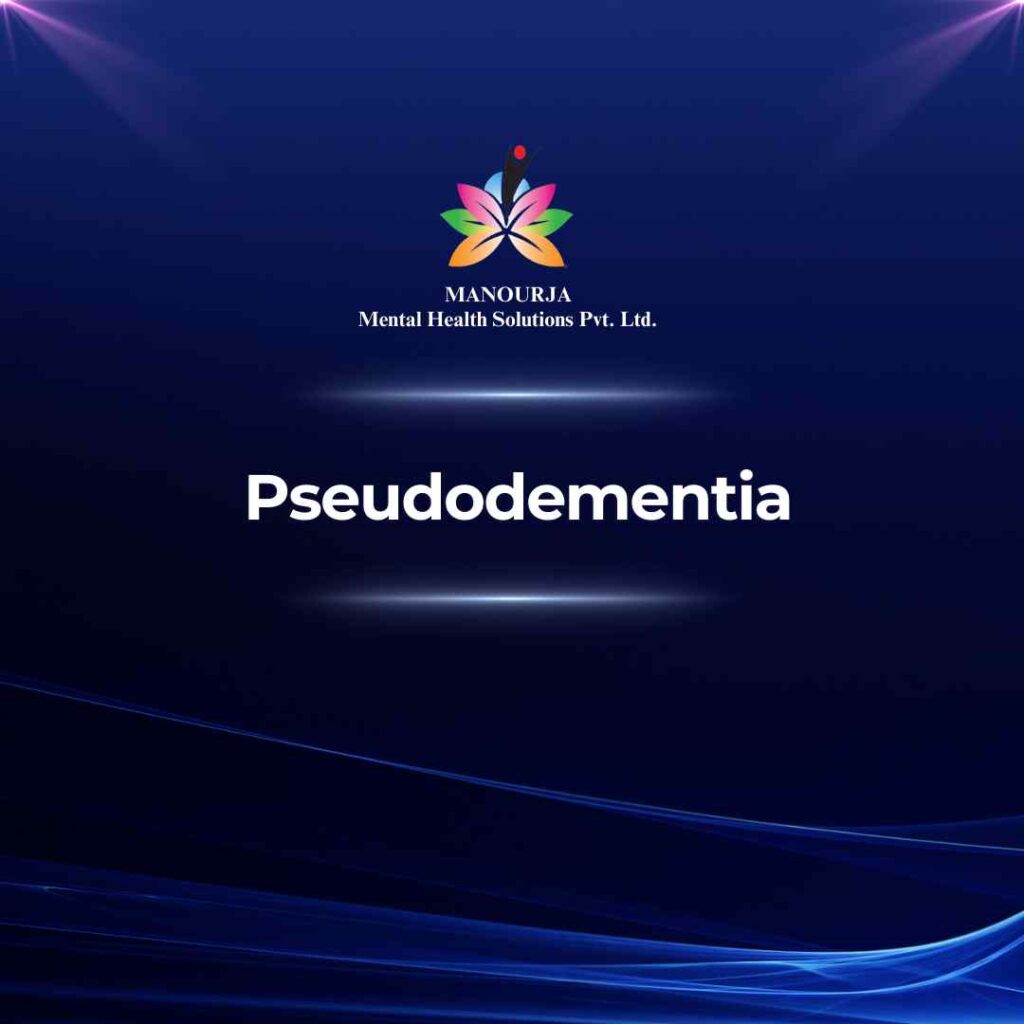Pseudodementia

“Pseudodementia” refers to a condition in which a person exhibits symptoms resembling dementia, such as memory loss, cognitive impairment, and difficulties with concentration and decision-making. However, unlike true dementia, pseudodementia is reversible and typically occurs in the context of another mental health condition, often depression. The term “pseudo” indicates that the dementia-like symptoms are not caused by irreversible brain damage but are instead a manifestation of another underlying disorder.
Pseudodementia as a Sign and Symptom of Mental Illness
Pseudodementia is primarily associated with depressive disorders, particularly severe depression in older adults. In these cases, cognitive impairments can be significant and mimic those seen in dementia, leading to challenges in diagnosis and treatment.
Mental Illnesses with Pseudodementia as Symptoms
Pseudodementia can occur in the following mental health disorders:
- Major Depressive Disorder (MDD): Severe depression, especially in older adults, can present with pseudodementia-like symptoms. These may include:
- Memory Loss: Difficulty remembering recent events or information.
- Cognitive Impairment: Problems with concentration, decision-making, and executive functioning.
- Psychomotor Retardation: Slowed thinking and movements.
- Apathy: Loss of interest or motivation in activities.
- Social Withdrawal: Avoidance of social interactions and activities.
- Bipolar Disorder: During depressive episodes of bipolar disorder, individuals may experience cognitive impairments similar to those seen in MDD, including pseudodementia symptoms. These symptoms typically improve as the depressive episode resolves.
- Anxiety Disorders: Severe anxiety or chronic stress can sometimes lead to cognitive difficulties that mimic pseudodementia. These symptoms may include memory problems and reduced concentration.
- Substance Use Disorders: Chronic substance abuse, particularly alcohol abuse, can cause cognitive impairments that resemble pseudodementia. These cognitive deficits may improve with abstinence from substances.
Managing and Treating Pseudodementia
Treatment for pseudodementia focuses on addressing the underlying depressive or other mental health disorder:
- Antidepressant Medications: Selective serotonin reuptake inhibitors (SSRIs) or other antidepressants may be prescribed to alleviate depressive symptoms and improve cognitive functioning.
- Psychotherapy: Cognitive-behavioral therapy (CBT) or other forms of psychotherapy can help individuals manage depressive symptoms, address negative thinking patterns, and improve coping strategies.
- Physical Health Management: Addressing any underlying medical conditions or lifestyle factors that may contribute to cognitive impairment, such as sleep disorders or poor nutrition.
- Supportive Interventions: Providing education and support to family members and caregivers to help them understand the nature of pseudodementia and its reversible nature.
- Monitoring and Follow-Up: Regular monitoring of cognitive functioning and adjustment of treatment as needed to ensure optimal management of symptoms.
Early recognition and treatment of pseudodementia are crucial for achieving favorable outcomes and preventing unnecessary distress and impairment. By addressing the underlying mental health condition, individuals can experience significant improvement in cognitive functioning and overall quality of life.
At MANOURJA, we believe in the transformative power of counseling. Our experienced therapists offer a safe and supportive space where you can explore your thoughts, emotions, and challenges. Through personalized counselling sessions, we’ll work together to develop coping strategies, build resilience, and achieve lasting positive change. Discover the path to a healthier, happier you with MANOURJA counselling services.
MANOURJA Rehabilitation Services
At MANOURJA, we’re dedicated to helping you in rebuild your life, after difficult times. Our rehabilitation services focus on understanding what you need to move forward, whether you’re recovering from addiction, trauma, or any psychological – social challenges. We create personalized plans, that are all about helping you, regain your strength and find hope again. With a caring team by your side, you’ll have the support to make real progress and take steps toward a brighter, healthier future.
